Is HTMX Dying?
Essay - Published: 2025.04.16 | 4 min read (1,156 words)
craft | create | featured | htmx | hypermedia | tech
DISCLOSURE: If you buy through affiliate links, I may earn a small commission. (disclosures)
A recent Reddit thread asked "Is HTMX slowly dying? And why is that?".
I've noticed other tweets / threads / discussions over the past few months with similar sentiment so in this post we'll try to answer that question - Is HTMX dying?
HTMX is Dying
First let's take a look at the main reasons the poster thinks HTMX is dying:
- HTMX is not hyped / talked about
- Google trends search traffic is decreasing
- Don't see any big competitors
I think all of these are valid observations. I've personally noticed less Hypermedia content appearing in my inbox / algorithms with the peak somewhere around 2023-2024 and the release of the Hypermedia Systems book.
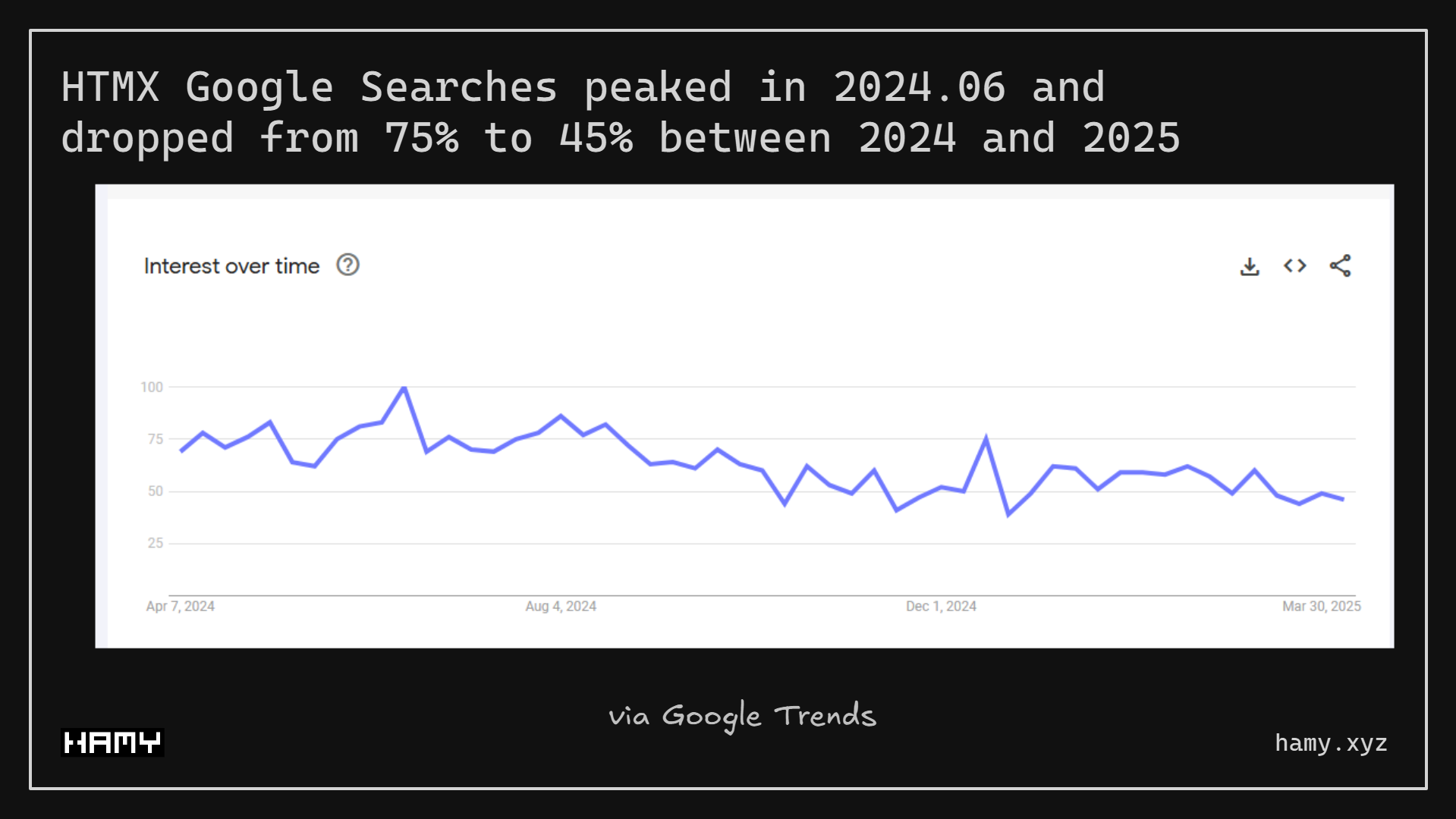
From Google Search trends we can see the peak in search traffic was around June of 2024 with traffic falling from an average of 75% to 45% between mid 2024 and mid 2025.
So yeah HTMX is being searched less and seemingly talked about less.
HTMX Usage Trends
Of course discourse on a technology does not necessarily track with usage. If a given tech is particularly controversial it might get talked about a lot while used a little. So here we'll take a look at various usage trends to see if HTMX is being used and what the trends look like.
In The State of HTMX 2024 we discussed how HTMX usage was actually booming in 2024:
- 22nd most popular web framework in Stack Overflow's 2024 Dev Survey, beating framworks like Astro and Fastify
- 9th most used web framework according to State of JS's 2023 survey
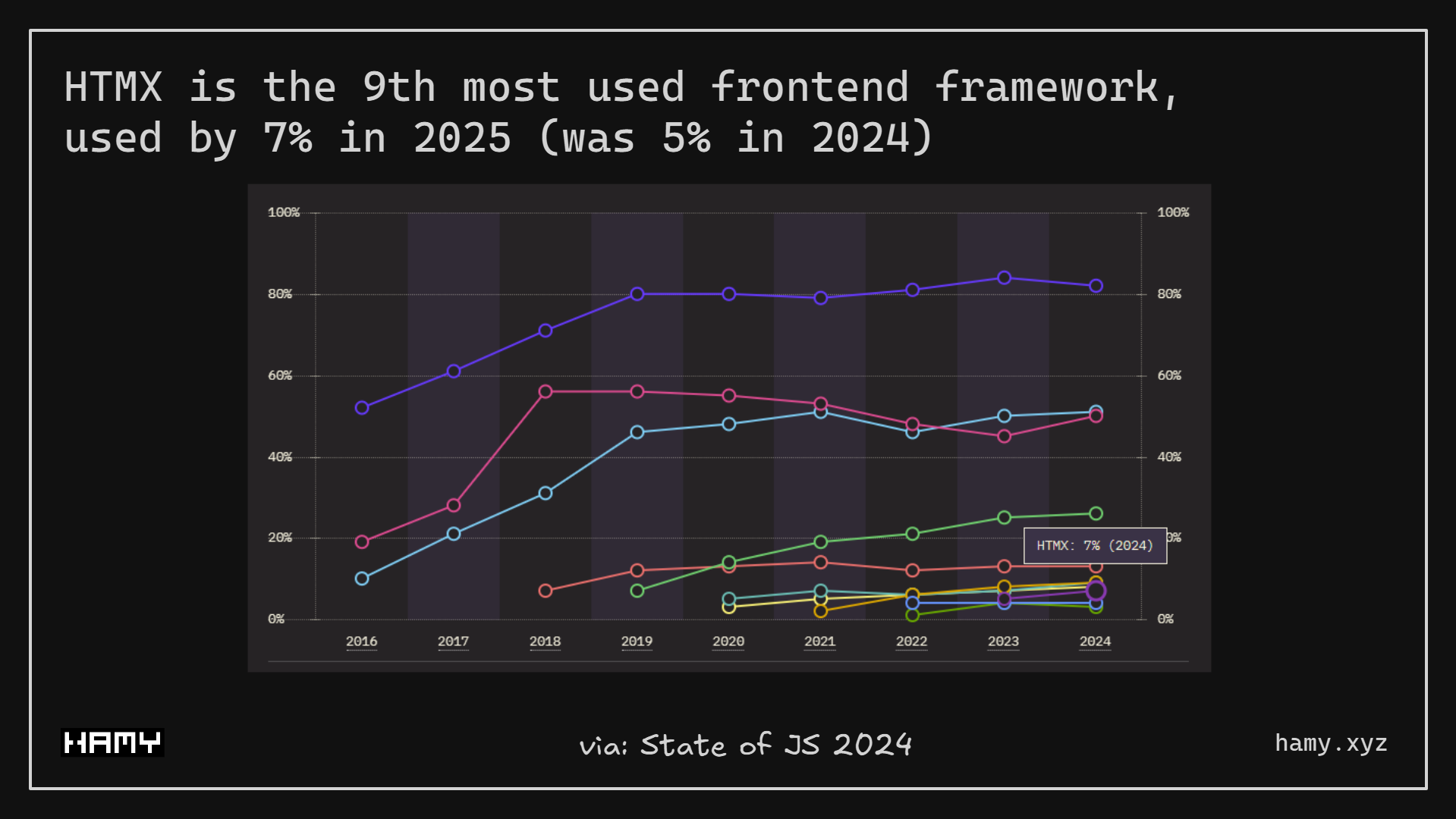
Now in 2025 we can look at State of JS's 2024 survey and see that HTMX is still 9th but has grown in usage from 5% to 7%. It's still a small library trailing the big 3 of React, Angular, and Vue but remains competitive against the rest of the field.
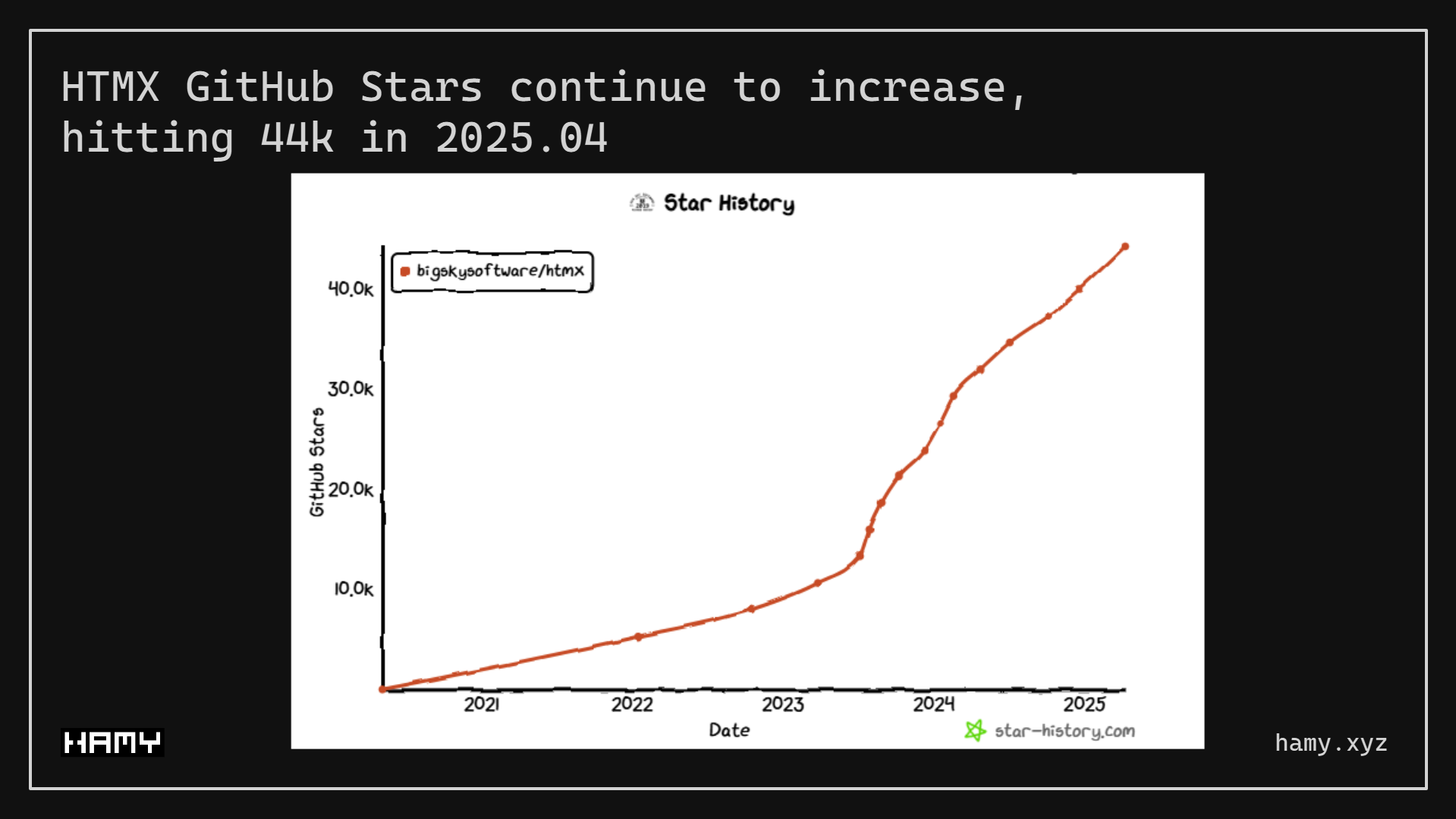
GitHub stars continue to rise, now hitting 44k stars. Stars don't mean that much as it's rare someone unstars something and starring it doesn't mean you're using it but it does indicate new people are finding the library.
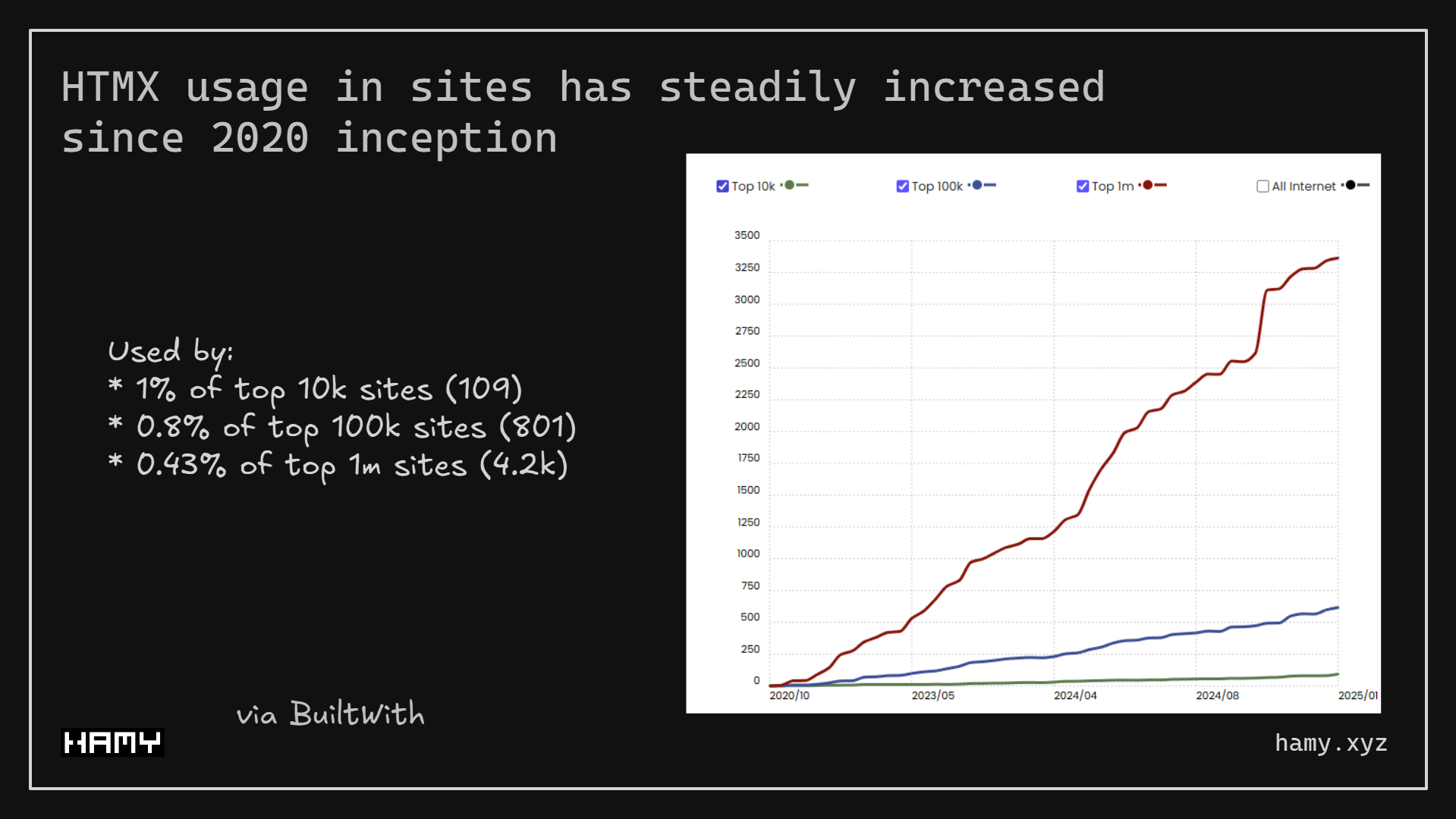
New sites are adding HTMX to their stacks at a steady clip. I would argue that this public-facing website data probably undersells HTMX's usage as many people first start using HTMX in internal sites which this dataset likely misses.
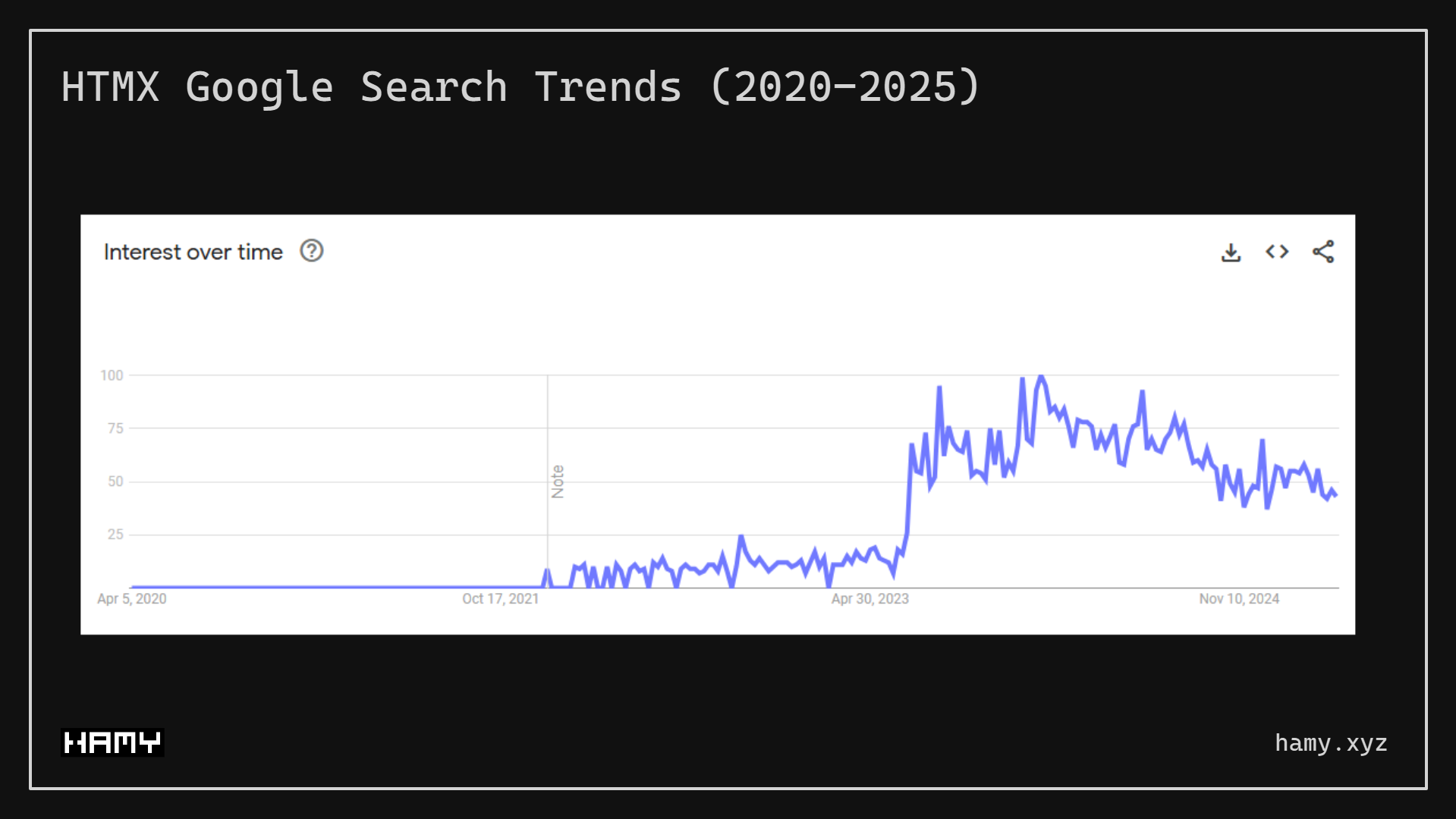
If we go back to our Google Search Trends and zoom out to the past 5 years, we see that HTMX is certainly not as searched as it was at its peak but it's also not falling drastically. This might just be the steady state after the initial hype cycle has worn off.
So all in all HTMX seems to be growing in usage at a rate similar to what it saw in 2024 but perhaps the hype has died down and it's getting searched / talked about less.
HTMX Competitors
The original poster mentioned that they haven't seen any big HTMX competitors. There actually are several competitors but many are smaller and some are things people wouldn't consider a competitor at first glance.
- Ruby's Hotwire Turbo framework
- Elixir's Phoenix framework
- jQuery's
load()functionality
All of these at its core try to use HTML over the wire instead of json data.
There are many smaller competitors as well:
To name a few. For more alternatives (and descriptions about how they work) checkout HTMX's Alternatives page.
Official HTMX Response
The creator of HTMX is perenially online (except during lent). His official response is "WHAT IS DEAD MAY NEVER DIE".
This is in reference to his essay The Future of HTMX where it's stated that HTMX is essentially feature complete.
- Stability as a feature - Focus on ensuring all existing HTMX usages don't break, landing fixes and improvements where it makes sense.
- No new features as a feature - In general no new functionality will be landed in the library core. New extensions can be added with the extensions API.
- Quarterly releases - No need to upgrade right away. If previous versions are working, stick with it.
In fact one of the points of HTMX is to see if this functionality could be added to the HTML standard (see triptych RFC). So perhaps one day HTMX will no longer be necessary - it will die and that's a good thing.
Included is a paragraph from Intercooler (HTMX's predecessor)'s docs and I really enjoyed it so copying it here:
Many javascript projects are updated at a dizzying pace. Intercooler is not.
This is not because it is dead, but rather because it is (mostly) right: the basic idea is right, and the implementation at least right enough.
This means there will not be constant activity and churn on the project, but rather a stewardship relationship: the main goal now is to not screw it up. The documentation will be improved, tests will be added, small new declarative features will be added around the edges, but there will be no massive rewrite or constant updating. This is in contrast with the software industry in general and the front end world in particular, which has comical levels of churn.
Intercooler is a sturdy, reliable tool for web development.
Tech will always have a hype cycle and the innovation that spins off has been great for the industry and the broader world. But sometimes it pays to hop off it and choose boring technology. It can usually accomplish similar things and often is a lot more calm and stable.
Next
HTMX is here to stay and it joins the ranks of other boring software that just works. So yeah HTMX may have left the hypecycle - and that seems to be by design. But that doesn't mean that HTMX is dying - far from it, it's actually setting itself up to be a foundational utility that people can use in webapps for as long as they wish.
I personally continue to build hypermedia-first apps with libraries like HTMX and Datastar and think it's a great way to build simple, scalable webapps. If you're on the fence, give it a try - I think you'll be surprised at how simple it is.
If you liked this post you might also like:
Want more like this?
The best way to support my work is to like / comment / share this post on your favorite socials.
Outbound Links
- The State of HTMX (2024)
- What it’s like to run HTMX in Production - Stories from Experienced Software Engineers
- Why you should choose HTMX for your next web-based side project - and ditch the crufty MPA and complex SPA
- The HAM Stack - A Simple Scalable Tech Stack for building modern web apps fast and cheap
